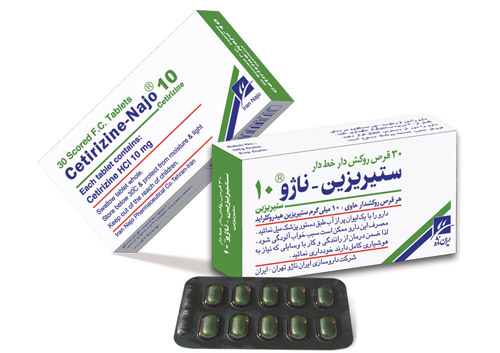
Cetirizine-Najo 10 MG TABLET

Category: Antihistamine.
INDICATIONS: Seasonal Allergic Rhinitis in adults and children 2 years of age and older, Perennial Allergic Rhinitis in adults and children 6 months of age and older, Chronic Urticaria in adults and children 6 months of age and older.
DOSAGE AND ADMINISTRATION:
Adults and Children 12 Years and Older: 5 mg or 10 mg per day in adults and children 12 years and older.
Children 6 to 11 Years: 5 mg or 10 mg once daily depending on symptom severity.
Children 2 to 5 Years: 2.5 mg once daily. The dosage in this age group can be increased to a maximum dose of 5 mg per day once a day or 2.5 mg every 12 hours, or one 5 mg chewable tablet once a day.
Dose Adjustment for Renal and Hepatic Impairment: In patients 12 years of age and older with decreased renal function and in hepatically impaired patients, a dose of 5 mg once daily is recommended. Similarly, pediatric patients aged 6 to 11 years with impaired renal or hepatic function should use the lower recommended dose. Dose Adjustment for Geriatric Patients: a dose of 5 mg once daily is recommended.
Mechanism of Action: Cetirizine HCl is a selective H1-receptor antagonist.
CONTRAINDICATIONS: Cetirizine HCl is contraindicated in those patients with a known hypersensitivity to it or any of its ingredients or hydroxyzine.
PRECAUTIONS: due caution should therefore be exercised when driving a car or operating potentially dangerous machinery. Concurrent use of Cetirizine HCl with alcohol or other CNS depressants should be avoided because additional reductions in alertness and additional impairment of CNS performance may occur.
Pregnancy: Pregnancy Category B
Nursing Mothers: Cetirizine has been reported to be excreted in human breast milk. Because many drugs are excreted in human milk, use of Cetirizine in nursing mothers is not recommended.
Geriatric Use: Cetirizine is known to be substantially excreted by the kidney, and the risk of toxic reactions to this drug may be greater in patients with impaired renal function. Because elderly patients are more likely to have decreased renal function, care should be taken in dose selection, and it may be useful to monitor renal function.
SIDE EFFECTS: Less frequent or rare but important: Anaphylaxis, Blood dyscrasias, Cardiac arrhythmia, Cholestasis, Covulsions, Edema, Neuritis, and Urticaria.
More frequent: Drowsiness, Dryness of mouth, throat, GI upset, nausea, headache, weight gain, pharyngitis.
DRUG INTERACTION: Alcohol, CNS depressant, Anticholinergic agent, MAO inhibitors,
How Supplied: Each pack contains of 3 blisters and 30 tablets.
storage: Store at 20-25°C; excursions permitted to 15-30°C.
For more information please refer to:
USPDI for Professional Health Care, 2007, page: 333.
IRAN NAJO PHARMACEUTICAL COMPANY
www.irannajo.com
Address:
No. 153, West Hoveiseh,
Sabounchi St., Sohrevardi Ave., Tehran 1533693317, Iran
Tel: +9821-88747363 Fax: +9821-88740644 info@irannajo.com